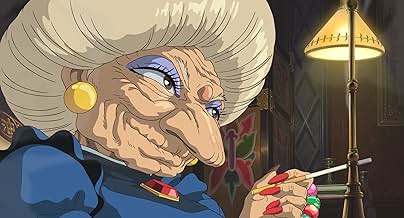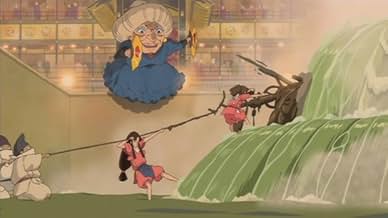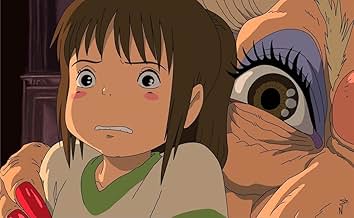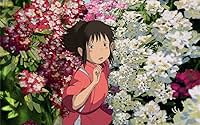Dopo essersi trasferita con la sua famiglia nei sobborghi di una città, una bambina di dieci anni scopre un modo dominato da dei, streghe e spiriti, in cui gli uomani vengono trasformati in ... Leggi tuttoDopo essersi trasferita con la sua famiglia nei sobborghi di una città, una bambina di dieci anni scopre un modo dominato da dei, streghe e spiriti, in cui gli uomani vengono trasformati in animali.Dopo essersi trasferita con la sua famiglia nei sobborghi di una città, una bambina di dieci anni scopre un modo dominato da dei, streghe e spiriti, in cui gli uomani vengono trasformati in animali.
- Vincitore di 1 Oscar
- 58 vittorie e 31 candidature totali
Daveigh Chase
- Chihiro
- (English version)
- (voce)
Suzanne Pleshette
- Yubaba
- (English version)
- (voce)
- …
Miyu Irino
- Haku
- (voce)
Rumi Hiiragi
- Chihiro Ogino
- (voce)
- …
Mari Natsuki
- Yubaba
- (voce)
- …
Takashi Naitô
- Akio Ogino
- (voce)
Tatsuya Gashûin
- Aogaeru
- (voce)
Ryunosuke Kamiki
- Bô
- (voce)
- (as Ryûnosuke Kamiki)
Yumi Tamai
- Rin
- (voce)
Yô Ôizumi
- Bandai-gaeru
- (voce)
Koba Hayashi
- Kawa no Kami
- (voce)
Takehiko Ono
- Aniyaku
- (voce)
Bunta Sugawara
- Kamajî
- (voce)
Trama
Lo sapevi?
- QuizThe cleansing of the river spirit is based on a real-life incident in Hayao Miyazaki's life in which he participated in the cleaning of a river, removing, among other things, a bicycle.
- BlooperAfter Haku flies out of the bedroom we see Sen's left hand touching more of the blood on the railing. The elevator attendant sees it on the same hand after grabbing her arm as she tries to board it. Not much later we see her looking at the same hand again before running across the pipe. It isn't till after being held captive by the baby under the cushions that the blood switches hands as he holds her by the left arm revealing no blood on that hand at all.
- Curiosità sui creditiThe credits have a series of still images from the film. The last image before the film fades is Chihiro's shoe in the river.
- Versioni alternativeVarious dialog is added to the English dub to explain settings, translate Japanese text, or traditions; for example, when Chihiro first sees the bathhouse, in the English dub, she says "It's a bathhouse", which isn't present in the Japanese version.
- ConnessioniEdited into Miyazaki Dreams of Flying (2017)
Recensione in evidenza
'Spirited Away' is the first Miyazaki I have seen, but from this stupendous film I can tell he is a master storyteller. A hallmark of a good storyteller is making the audience empathise or pull them into the shoes of the central character. Miyazaki does this brilliantly in 'Spirited Away'. During the first fifteen minutes we have no idea what is going on. Neither does the main character Chihiro. We discover the world as Chihiro does and it's truly amazing to watch. But Miyazaki doesn't seem to treat this world as something amazing. The world is filmed just like our workaday world would. The inhabitants of the world go about their daily business as usual as full with apathy as us normal folks. Places and buildings are not greeted by towering establishing shots and majestic music. The fact that this place is amazing doesn't seem to concern Miyazaki.
What do however, are the characters. Miyazaki lingers upon the characters as if they were actors. He infixes his animated actors with such subtleties that I have never seen, even from animation giants Pixar. Twenty minutes into this film and I completely forgot these were animated characters; I started to care for them like they were living and breathing. Miyazaki treats the modest achievements of Chihiro with unashamed bombast. The uplifting scene where she cleanses the River God is accompanied by stirring music and is as exciting as watching gladiatorial combatants fight. Of course, by giving the audience developed characters to care about, the action and conflicts will always be more exciting, terrifying and uplifting than normal, generic action scenes.
Through Chihiro, Miyazaki is clearly (but non-patronisingly) talking to youth of Japan. There's a certain sense of revile about the youth of Japan at the moment. Many people consider them to be ill-mannered and baring no respect for their elders or their forefathers. They are simply bi-products of their material world and consumerism. 'Spirited Away' taps into this. At the start Chihiro is a selfish, spoiled, whiny brat. But as she plunges deeper into the spirit world, she becomes more independent, more assured, more respectful and learns some manners. No Face, a black figure with a white mask, is the catalyst behind Chihiro's transformation. Once he is let into the bathhouse, we are no longer tourists the story propels forth. Watching No Face prey on the greed of the workers is a terrifying delight. The three main characters in Miyazaki's youth allegory are Chihiro, No Face and Bô. All of these characters are disconnected with their world. They are lonely, misunderstood and largely ignored. But when they go on their journey together, they united and become stronger individuals.
Miyazaki also talks about the ecology of Japan. What was once a beautiful; grassland has now turned into the Asian New York. That The Last Samurai had to be filmed in New Zealand to get a turn of the century Japanese look speaks volumes. The River God sequence is an unsubtle but unpretentious commentary on pollution. While these two themes are very much current in Japan, they are also universal themes which makes 'Spirited Away' a universal story that most of us can connect with. I'm willing to bet everyone reading this has at some time seen bicycles lying on a lake bed or have had a child talk to them disrespectfully. Sure these themes aren't advanced philosophy. They are everyday issues told in an inventive, fun way.
The animation is wonderful, if not as smooth as Disney's works but there's something superior to that. 'Spirited Away's imperfect, but detailed world is far more fascinating than the perfected blandest of Disney's latest offerings. The animators successfully balanced the tight-rope between not-enough animation on characters and too much animation on characters. No Ralph Balski ADD antics here! The film is full of vivid images both beautiful and horrifying. The line between those two extremes is crossed over seamlessly. From Chihiro and Haku running through an opening flower field to Haku's dragon snarling with a bloody mouth, both extremes seem to belong in the film. It's also excellently done with the characters. Kamaji can be seen as a scary, daunting figure at the beginning, but soon he seamlessly changes into a humble, wise figure. Yubaba also seems to be able to turn from kind to witch with the snap of a finger.
The sound on the film was expertly done. The sounds perfectly match the on screen actions and objects. My sub woofer got a wonderful workout when Haku swoops Chihiro past the bridge at the beginning. And while I don't speak Japanese, I think the voice actors did a wonderful job of conveying their personality and emotions true their voice. Joe Hisaishi's music is sublime, definitely one of my favourite scores. His main piano theme is simple and evocative. His thunderous action music hits the viewers on the chest like a hammer. Like all great scores it heightens the greatness of a scene about three times. The score, unlike many American composers', is unobtrusive. It plays excellently with the scenes, but never overbears them. A lot of the time the it is barely noticeable, a sole piano plays softly in the background evoking a dreamlike/lullaby quality.
'Spirited Away' is a simply a modern masterpiece, easily one of the Top 10 films of the new millennium. It works on a multitude of levels; a social commentary on Japan, a homage to ancient Japanese/Russian mythology, a moral film for both children and adults. But most importantly, it is a simple story brilliantly told by a great filmmaker who appears to be at the top of his game. 'Spirited Away' works much like a relaxing journey. Pop in the DVD; leave this world for two hours and when you will be almost certainly enriched and ready to take the trip again.
What do however, are the characters. Miyazaki lingers upon the characters as if they were actors. He infixes his animated actors with such subtleties that I have never seen, even from animation giants Pixar. Twenty minutes into this film and I completely forgot these were animated characters; I started to care for them like they were living and breathing. Miyazaki treats the modest achievements of Chihiro with unashamed bombast. The uplifting scene where she cleanses the River God is accompanied by stirring music and is as exciting as watching gladiatorial combatants fight. Of course, by giving the audience developed characters to care about, the action and conflicts will always be more exciting, terrifying and uplifting than normal, generic action scenes.
Through Chihiro, Miyazaki is clearly (but non-patronisingly) talking to youth of Japan. There's a certain sense of revile about the youth of Japan at the moment. Many people consider them to be ill-mannered and baring no respect for their elders or their forefathers. They are simply bi-products of their material world and consumerism. 'Spirited Away' taps into this. At the start Chihiro is a selfish, spoiled, whiny brat. But as she plunges deeper into the spirit world, she becomes more independent, more assured, more respectful and learns some manners. No Face, a black figure with a white mask, is the catalyst behind Chihiro's transformation. Once he is let into the bathhouse, we are no longer tourists the story propels forth. Watching No Face prey on the greed of the workers is a terrifying delight. The three main characters in Miyazaki's youth allegory are Chihiro, No Face and Bô. All of these characters are disconnected with their world. They are lonely, misunderstood and largely ignored. But when they go on their journey together, they united and become stronger individuals.
Miyazaki also talks about the ecology of Japan. What was once a beautiful; grassland has now turned into the Asian New York. That The Last Samurai had to be filmed in New Zealand to get a turn of the century Japanese look speaks volumes. The River God sequence is an unsubtle but unpretentious commentary on pollution. While these two themes are very much current in Japan, they are also universal themes which makes 'Spirited Away' a universal story that most of us can connect with. I'm willing to bet everyone reading this has at some time seen bicycles lying on a lake bed or have had a child talk to them disrespectfully. Sure these themes aren't advanced philosophy. They are everyday issues told in an inventive, fun way.
The animation is wonderful, if not as smooth as Disney's works but there's something superior to that. 'Spirited Away's imperfect, but detailed world is far more fascinating than the perfected blandest of Disney's latest offerings. The animators successfully balanced the tight-rope between not-enough animation on characters and too much animation on characters. No Ralph Balski ADD antics here! The film is full of vivid images both beautiful and horrifying. The line between those two extremes is crossed over seamlessly. From Chihiro and Haku running through an opening flower field to Haku's dragon snarling with a bloody mouth, both extremes seem to belong in the film. It's also excellently done with the characters. Kamaji can be seen as a scary, daunting figure at the beginning, but soon he seamlessly changes into a humble, wise figure. Yubaba also seems to be able to turn from kind to witch with the snap of a finger.
The sound on the film was expertly done. The sounds perfectly match the on screen actions and objects. My sub woofer got a wonderful workout when Haku swoops Chihiro past the bridge at the beginning. And while I don't speak Japanese, I think the voice actors did a wonderful job of conveying their personality and emotions true their voice. Joe Hisaishi's music is sublime, definitely one of my favourite scores. His main piano theme is simple and evocative. His thunderous action music hits the viewers on the chest like a hammer. Like all great scores it heightens the greatness of a scene about three times. The score, unlike many American composers', is unobtrusive. It plays excellently with the scenes, but never overbears them. A lot of the time the it is barely noticeable, a sole piano plays softly in the background evoking a dreamlike/lullaby quality.
'Spirited Away' is a simply a modern masterpiece, easily one of the Top 10 films of the new millennium. It works on a multitude of levels; a social commentary on Japan, a homage to ancient Japanese/Russian mythology, a moral film for both children and adults. But most importantly, it is a simple story brilliantly told by a great filmmaker who appears to be at the top of his game. 'Spirited Away' works much like a relaxing journey. Pop in the DVD; leave this world for two hours and when you will be almost certainly enriched and ready to take the trip again.
- Le-Samourai
- 19 lug 2004
- Permalink
I più visti
Accedi per valutare e creare un elenco di titoli salvati per ottenere consigli personalizzati
Dettagli
- Data di uscita
- Paesi di origine
- Siti ufficiali
- Lingue
- Celebre anche come
- El viaje de Chihiro
- Aziende produttrici
- Vedi altri crediti dell’azienda su IMDbPro
Botteghino
- Budget
- 19.000.000 USD (previsto)
- Lordo Stati Uniti e Canada
- 15.205.725 USD
- Fine settimana di apertura Stati Uniti e Canada
- 449.839 USD
- 22 set 2002
- Lordo in tutto il mondo
- 358.380.478 USD
- Tempo di esecuzione2 ore 4 minuti
- Colore
- Mix di suoni
- Proporzioni
- 1.85 : 1
Contribuisci a questa pagina
Suggerisci una modifica o aggiungi i contenuti mancanti






























